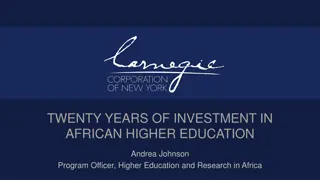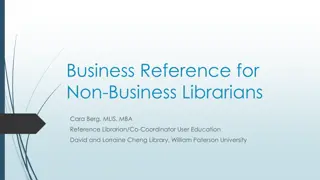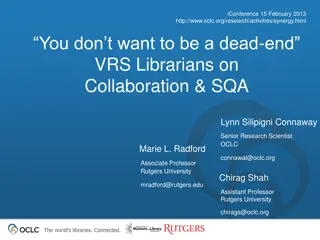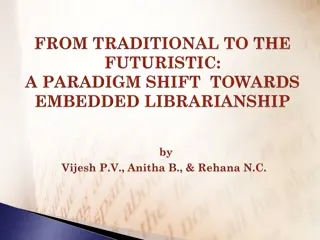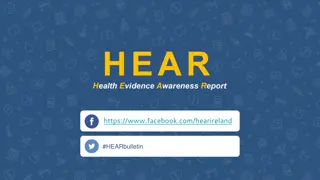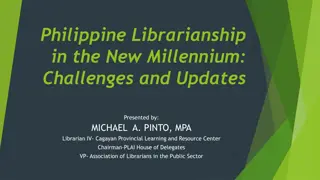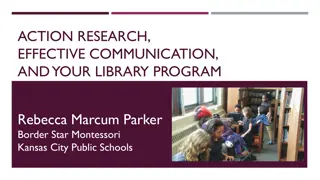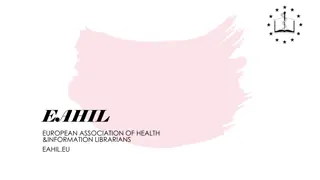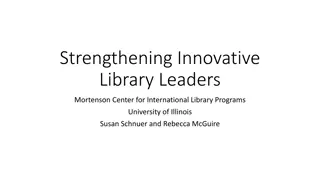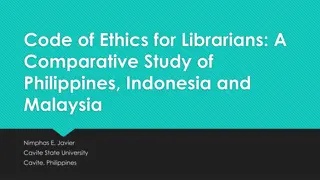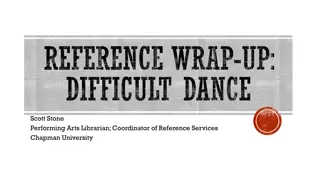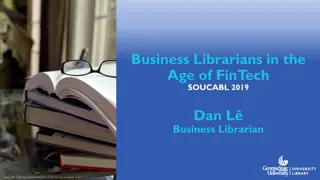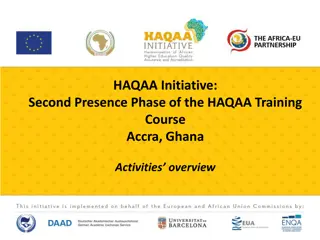Librarians in African Higher Education: Embedding NREN Digital Services
Librarians in African higher educational institutions play a crucial role in embedding NREN digital services. Studies reveal institutional weaknesses hindering librarian skills development and OA resource accessibility. The bigger picture involves the digitalization trend impacting information management and the evolving role of librarians. Addressing training, funding, and infrastructure gaps is vital for enhancing librarian capabilities in facilitating open access and digital initiatives.
Download Presentation

Please find below an Image/Link to download the presentation.
The content on the website is provided AS IS for your information and personal use only. It may not be sold, licensed, or shared on other websites without obtaining consent from the author. Download presentation by click this link. If you encounter any issues during the download, it is possible that the publisher has removed the file from their server.
E N D
Presentation Transcript
The Role of Librarians in African Higher Educational Institutions as Central Actors in Embedding NREN Digital Services Dr Pamela Abbott Senior Lecturer, Information School, Sheffield University, UK Email: p.y.abbott@sheffield.ac.uk
Outline Motivation The Bigger Picture Information Management Emerging Librarian role A Research Agenda
Previous Work TANDEM survey of end-user needs in the WACREN area academics, researchers & technicians revealed: End-community of librarians in higher education play a pivotal role in the identification, provision and dissemination of information resources through the services offered by RENs Among the prioritized areas for their service users was open access data repository services Institutional weaknesses identified as an issue.
Nigerian Study on Librarian Skills Identifies institutional weaknesses leading to lack of adequate digital skills acquisition: Ignorance and apathy among librarians Poor funding of libraries Lack of funds to pay/sponsor for the training Lack of facilities needed for such training in some of the skills programmers Insufficient skilled personnel to train the librarians in the country Limited training opportunities within the country Lack of motivation by the library administration.
Nigerian Study on OA Awareness Issues faced by Nigerian academic libraries in playing a key role in developing OA resources: Depleted budgets Unavailability of IT facilities Insufficient skills to access web resources Lack of opportunity to access repositories, databases and OA resources Lack of affordability of computer resources is frequently mentioned.
Digitalisation The general trend towards transforming traditional content and media, into digital representations, which has implications for how these altered formats can be transmitted, shared and consumed, thus affecting and potentially disrupting business models in industry and the delivery of learning and teaching in education. Some direct impacts for librarians: Traditional information resources digital assets Traditional library collections digital collections Traditional research support research data management/digital curation, etc.
Digitalisation & Convergence Convergence of communication and information technologies and the development of cheaper, faster and more convenient hardware together with the platformization of IT services, e.g. cloud computing, create a situation where computers are a ubiquitous commodity and content is available on request.
Digitalisation & Dematerialisation Digitalisation leads eventually to dematerialisation, i.e., the physical and tangible become the virtual and intangible. The result is that the skills learnt to deal with material properties of objects need to change due to dematerialisation. This leads to: De-skilling: loss of traditional skill sets Re-skilling: learning new digital skill sets Up-skilling: trading up to higher level skills that are not easy to automate.
The Contemporary University On demand courses Lifelong learning University as a partner to business Providing value to the market Emphasis on information Student as customer Anywhere/everywhere availability Multidisciplinarity Emphasis on technology Globalisation of higher education.
New HE Challenges Publication and scholarly communication (e.g. open access) Delivery and use of digital resources (e.g. open data and open repositories) Students from different backgrounds, locations, abilities, ethnicities Increasing demand for traditional resources New channels for delivering learning (e.g. distance learning, MOOCs, open education) Doing more with less, reduction of resources, particularly in staffing.
The Open Movement The open movement seeks to work towards solutions of many of the world s most pressing problems in a spirit of transparency, collaboration, re-use and free access. It encompasses open data,open government,open development,open science and much more. Participatory processes, sharing of knowledge and outputs and open source software are among its key tools. The specific definition of open as applied to data, knowledge and content, is set out by the Open Definition. From: http://opendatahandbook.org/glossary/en/terms/open- movement/
The Librarian as Information Specialist Key roles emerge: Information retrieval Information seeking Information literacy Information organisation These roles support the academic/researcher in making sense of data and interpreting it for their own specialism
Other New Digital Roles Systems librarian Electronic resource librarian Digital librarian Institutional repository manager Clinical librarian and informationist Digital curator/research data manager Teaching librarian/information literacy educator Information and knowledge manager.
INFORMATION MANAGEMENT
Information Management Concerned with all aspects of managing information within organisations NOT the management of Information Technology (IT) NOT the management of Information Systems (IS) Related, because IT used to store information Related, because IS used for processing information
Information Management Contd Information Management Cycle Gathering information Analysing information Communicating information Storing information Disposing of information Evaluating information needs Gathering Evaluating Analysing Disposing Communicating Storing
Information Hierarchy Data Unstructured facts Increasingly heterogeneous Large data repositories Globally distributed sources Information Selectively adding meaning to data Relational and contextual Knowledge Larger structures of related information
Implications for Managing Information Governance of information Establishing standards/policies Identifying Information needs Management of information resources Data accuracy, timeliness, integrity etc. Data preservation, curation Knowledge/content management Security/privacy concerns
Information Management & Librarianship Traditional librarian role re IM: To select, acquire, classify, catalogue, provide, archive or give access to, and assist people in the use of, information Role definitions/re-conceptualisations: Information literacy advocates Information access providers Information resource managers Information policy makers Information strategists Information technologists
EMERGING LIBRARIAN ROLE
The Role of the Academic Library Students and faculty alike fail to involve library resources and services in regular learning and instruction, turning to the library primarily as an undergraduate study hall or reserve book room National initiatives much less to plan, improvement of library resources is] a disheartening decrease in academic library share of institutional funding they remain, for the most part, on the periphery of decision-making and innovative processes librarians are often not involved in information policy development. In all, the 'library is the heart of the university' metaphor leads librarians and academics to erroneous conclusions about the real relationships between the library and the university. (Brophy, 2001:21) fail to mention, [There
Academic Libraries Response Changing librarian s roles and responsibilities Developing a service-oriented model of collection development and dissemination Providing free and equal access to information Keeping up-to-date with ICT developments Leading in digitalisation movements Understanding new learning and teaching schemes, new economic/business models and new regulatory frameworks.
A Central Role Changes could catapult the library into a central role within the teaching/learning enterprise if appropriate adaptations are made; if not, they could further remove the library from the institutional centre (CETUS, 1997).
Institutional Factors Structure Role played by the library function vis- -vis teaching and research How the library function is integrated with other support functions, e.g. the IT function Rules, regimes, standards The rules of the game how libraries actually function, their constraints and enablers Norms Institutional logics driving the librarian function Culture Organisational culture, professional culture, cross- over professions, boundary spanning roles
Nolans Stages Adapted to IM Initiation IT-related solutions restricted to some super users Contagion IT-related applications in widespread use throughout organisation Control Planning for IT-related functions becomes a priority Integration Wider integration of platforms/users across organisation Data administration Information needs, value and utilisation of data prioritised Maturity IT, policy, management, resources, allocations all aligned on an ongoing basis
Research Agenda & Draft Survey RQ: How to develop sustainable institutional support for HE librarians to play a central role in providing services linked to Open movements through NREN infrastructure? Main Outcomes: Identifying institutional factors that constrain or enable a more central role for librarians as information managers in West and Central African HE institutions. Developing and launching a wide-ranging survey to investigate the issues currently experienced by the HEI librarian communities of practice in establishing efficient and sustainable information resource management capabilities within HEIs in the West and Central African region.
Activities So Far Draft Skeleton Survey Designed and shared on the Discussion About Libraries in WACREN mailing list in January Feedback incorporated and further comments taken at the AULNU workshop on 5-8th March in Abuja Launch of draft survey at WACREN Librarian s Workshop on 27-28th March in Abidjan Further feedback gathered from interactive Q&A
Feedback Gathered Feedback is mixed, varied: In general positive Some wide disparities in experience with digital technologies and administrative roles A few surprises (e.g. gender, age and designation may be contributing factors) Potential country/regional differences to be accounted for Various levels of librarian status to be accounted for, e.g. managerial, operational Distinction to be made between institutional role of the library/librarian and digital skills of the people who carry out this role.
Draft Survey Design - Aims The survey should: Produce an overview of librarians current and evolving roles as information specialists and managers within higher education institutions especially regarding digital content and how NREN services can support this evolving role Help to provide information on the ongoing positioning of librarians as institutional focal points for NREN services Produce results that may be able to influence policy within the HEI sector.
Draft Survey Design - Objectives Understand the evolving role of the librarian in contemporary higher education settings. This will especially mean understanding the role of librarians vis- -vis digital resources. Understand how institutions within the higher education sector support or constrain the roles of librarians, especially where these are concerned with management of digital resources. Elicit the NREN service requirements that librarians need to support their roles Gather demographic information that would be useful in categorizing the librarian communities of practice so as to understand the evolving field better. 1. 2. 3. 4.
Next Steps Continue further development of the questionnaire Work with Cote d Ivoire collaborator on French language version simultaneously Final questionnaire to be piloted through the WACREN mailing list by end of April After the pilot, a plan to be made for the eventual distribution of the survey, collection of results etc. Work on further aspects of a wider research agenda Seek project funding
References Brophy, P. (2001)The Library in the Twenty-first Century: new services for the information age. London: Library Association Publishing. CETUS (1997) The Academic Library in the Information Age: changing roles. (Discussion Series). Consortium for Educational Technology for University Systems, California State University, City University of New York, State University of New York,. http://www.gvsu.edu/library/librarylights/winter02/ChangingRoles.html Cox, A.M. and Corral, S. (2013). Advances in Information Science: Evolving Academic Library Specialities. Journal of the American Society for Information Science and Technology, 64(8), p. 1526-1542. Emmanuel Dickson Chigbu Ezinne O. Njoku Ngozi Uzoagba , (2016),"Management and usage of open access scholarly online resources in university libraries in Nigeria Librarians viewpoints ", The Electronic Library, Vol. 34 Iss 6 pp. 974 984 Hinton, M. (2006) Introducing Information Management: the business approach. Oxford: Elsevier Butterworth-Heinemann. Nolan, R. (1979) Managing the crisis in data processing. Harvard Business Review, March April, p. 115. Ojedokun A Ayoku Victoria Nwamaka Okafor , (2015)," ICT skills acquisition and competencies of librarians Implications for digital and electronic environment in Nigerian universities libraries ", The Electronic Library, Vol. 33 Iss 3 pp. 502 523 Virkus, S. & Metsar, S., (2004). General Introduction to the Role of the Library for University Education. LIBER Quarterly. 14(3-4). DOI: http://doi.org/10.18352/lq.7780






